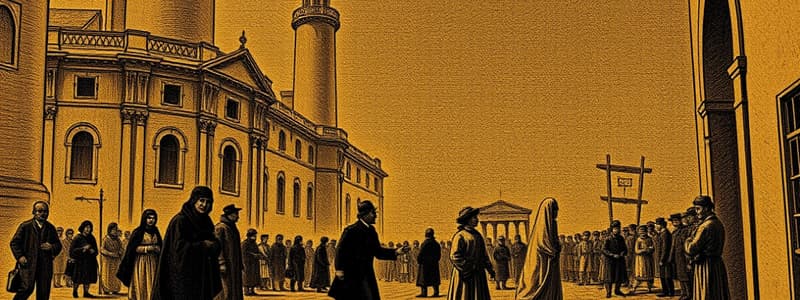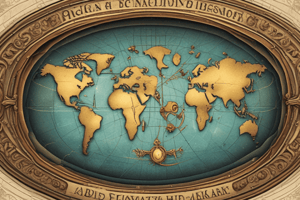Podcast
Questions and Answers
What is social science history?
What is social science history?
Social science history is the study of social structures and relationships over time, using methods from both social sciences and historical analysis.
Name one key figure from ancient civilizations who contributed to early sociology.
Name one key figure from ancient civilizations who contributed to early sociology.
Plato or Aristotle.
How did religion and feudalism influence social organization in the Middle Ages?
How did religion and feudalism influence social organization in the Middle Ages?
Religion provided a moral and ethical framework, while feudalism created hierarchical social structures.
What major intellectual movements emerged during the Renaissance and Enlightenment?
What major intellectual movements emerged during the Renaissance and Enlightenment?
Which two social science disciplines were institutionalized in the 19th century?
Which two social science disciplines were institutionalized in the 19th century?
What impact did Marxism have on social sciences in the 20th century?
What impact did Marxism have on social sciences in the 20th century?
What is cultural relativism?
What is cultural relativism?
Name a qualitative method used in social science research.
Name a qualitative method used in social science research.
Flashcards are hidden until you start studying
Study Notes
Overview of Social Science History
- Definition: Social science history is the study of social structures and relationships over time, incorporating methodologies from both social sciences and historical analysis.
Key Periods in Social Science History
-
Ancient Civilizations
- Early forms of sociology in ancient Greece (e.g., Plato, Aristotle).
- Historical record-keeping in Mesopotamia, Egypt, and China.
-
Middle Ages
- Influence of religion and feudalism on social organization.
- Development of political thought (e.g., St. Augustine, St. Thomas Aquinas).
-
Renaissance and Enlightenment (14th-18th century)
- Rise of humanism and individualism.
- Emergence of rationalism and empirical observation (e.g., Montesquieu, Rousseau).
-
19th Century
- Institutionalization of social sciences (e.g., sociology, anthropology).
- Key figures: Karl Marx (class struggles), Auguste Comte (positivism), Emile Durkheim (social facts).
-
20th Century
- Expansion of social science disciplines (psychology, economics).
- Influence of Marxism, behaviorism, and structuralism.
Major Disciplines within Social Science
- Sociology: Study of social behavior and society.
- Anthropology: Focus on cultures, human evolution, and social practices.
- Political Science: Examination of governance, political processes, and institutions.
- Economics: Analysis of production, distribution, and consumption of goods and services.
- Psychology: Study of the human mind and behavior in social contexts.
Methodologies
- Qualitative Methods: Interviews, ethnography, case studies.
- Quantitative Methods: Surveys, statistical analysis, experiments.
- Mixed Methods: Combination of qualitative and quantitative approaches.
Contemporary Issues in Social Science History
- Influence of globalization on social structures.
- Impact of technology on social interactions and research methodologies.
- Critical theory and its role in understanding power dynamics.
Important Concepts
- Social Structure: Patterns of relationships and social arrangements.
- Cultural Relativism: Understanding cultural practices within their own context.
- Social Change: The transformation of culture and social institutions over time.
Notable Thinkers
- Max Weber: Considered the importance of understanding social action.
- Sigmund Freud: Explored psychological aspects influencing social behavior.
- Michel Foucault: Analyzed power relations within societies.
Conclusion
- Social science history provides insights into the evolution of human societies and the complex interplay between social dynamics and historical events. Understanding these concepts is essential for analyzing current social issues and trends.
Overview of Social Science History
- Social science history examines social structures and relationships over time, merging methodologies from social sciences and historical analysis.
Key Periods in Social Science History
-
Ancient Civilizations:
- Early sociology found in Greek philosophy, particularly in the works of Plato and Aristotle.
- Significant record-keeping practices in Mesopotamia, Egypt, and China document societal structures.
-
Middle Ages:
- Religion and feudalism notably shaped social organization and hierarchies.
- Political thought advanced through thinkers like St. Augustine and St. Thomas Aquinas.
-
Renaissance and Enlightenment (14th-18th century):
- Humanism and individualism gain prominence, influencing social thought.
- Rationalism and empirical observation rise, with key figures such as Montesquieu and Rousseau contributing to political theory.
-
19th Century:
- Formal establishment of social sciences like sociology and anthropology, focusing on systematic analysis.
- Influential theorists include Karl Marx, emphasizing class struggles; Auguste Comte, known for positivism; and Emile Durkheim, who introduced the concept of social facts.
-
20th Century:
- Broader expansion of social science disciplines, including psychology and economics.
- Dominant theories include Marxism, behaviorism, and structuralism, impacting understanding of social phenomena.
Major Disciplines within Social Science
- Sociology: Investigates social behavior, institutions, and societal organization.
- Anthropology: Studies cultures, human evolution, and diverse social practices.
- Political Science: Analyzes governance, political structures, and behavioral processes.
- Economics: Focuses on production, distribution, and consumer behavior.
- Psychology: Explores mental processes and behaviors within social contexts.
Methodologies
- Qualitative Methods: Involve engaging interviews, ethnographic studies, and detailed case analyses to gather in-depth insights.
- Quantitative Methods: Employ statistical techniques, surveys, and experimental designs for data analysis.
- Mixed Methods: Utilize both qualitative and quantitative techniques for a comprehensive understanding.
Contemporary Issues in Social Science History
- Globalization's significant effects on social structures and interactions.
- The transformative role of technology in shaping social research and interpersonal communication.
- The application of critical theory in assessing power dynamics within societies.
Important Concepts
- Social Structure: Refers to established patterns of relationships and organization within a society.
- Cultural Relativism: Advocates for understanding cultural practices in their specific contexts without bias.
- Social Change: Describes the evolution and transformation of cultural norms and social institutions over time.
Notable Thinkers
- Max Weber: Emphasized the significance of understanding individual social actions.
- Sigmund Freud: Investigated psychological factors that affect social behavior and interactions.
- Michel Foucault: Focused on the analysis of power relations embedded within social frameworks.
Conclusion
- Insights from social science history illuminate the development of human societies and highlight the complex interactions between social dynamics and historical contexts, crucial for comprehending contemporary social issues and trends.
Studying That Suits You
Use AI to generate personalized quizzes and flashcards to suit your learning preferences.



